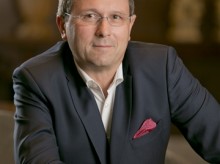The Nokia man and the sea: Getting to know Friedrich Trawoeger
For Friedrich Trawoeger there is no real distinction between personal and professional life.
As head of the Cloud and Cognitive Services organization, he oversees a range of advanced and managed services that look to ease the earth’s environmental and sustainability challenges. And as a passionate offshore sailor, who has navigated parts of the globe in a vessel that he largely automated and optimized himself, he has witnessed them first-hand.
An engineer by training, who developed his first phone system as a child, the 56-year-old Trawoeger tends to implement much of what he pursues at Nokia in his own life.
“Since early childhood, my desire was always to improve things and get involved in areas that make a difference to society and the environment,” he said. “My curiosity about exploring new ways and venturing into uncharted territory is also what I am looking for when I’m out on the water.”
Though he’s been at Nokia for 17 years, and in the telecom industry since 1997, the Austrian-born Trawoeger said he’s been drawn to the field since as early as the age of six, when he wired his home with meters of strings and cups and then used batteries and bulbs to indicate when one of these “calls” was being made. Before he was 10, he took apart two radios to engineer a functioning phone connection.
Coming from a family of engineers, he would later study industrial and microelectronics at the University of Hannover and economics and social sciences at the University of Vienna.
His early career focused on industrial automation and he was dispatched to monthlong projects in China, Russia, Bulgaria and elsewhere. On one such project he was tasked with creating an environmental control system to monitor and reduce pollution.
So, he launched a small engineering company with a friend that was devoted to similar environment issues. He took that can-do approach to the telecom industry in future stops at ONE (now Hutchison3), Alcatel and Alcatel-Lucent.
“To me, it was always important to understand the impact of what we do and how we do it and how we can do it better,” he said. “I realized that I was part of a massive change to the world and to the lives of people who were eventually enabled to use a phone anywhere and get access to systems that they weren’t able to use before.”
It also aligned with a life spent close to nature. He later moved with his family to New Zealand, where he began sailing more seriously in the South Pacific Ocean.
Trawoeger’s 31-year-old daughter is now an architect and his 28-year-old son is an engineer focusing on research and design for next-generation electric car systems. His wife is a passionate violinist, and his first mate out at sea.
Trawoeger’s eclectic set of interests includes playing the cello, listening to classical music and cooking his own food. He quotes Albert Einstein and Anne Frank as inspirations.
His primary base is in Malta and he also splits time between residences in Spain and Austria. But he’s most at home aboard a 57-foot sailing yacht named Mojo, on which he typically takes extended cruises of up to 2,500 nautical miles. He’s travelled to many exciting corners of the globe, but says his dream remains to complete a full circumnavigation.
“The real freedom starts for me at the point when you lose sight of land. It doesn’t matter how rough it can be, this is where you feel alive,” he said. “And, as in sailing, that’s something that moves me forward in professional life too. I need to do new things that give me exposure to the elements without the predefined path toward a safe haven. If you always drive a road that is very nicely paved, that is easy. But sometimes you just have to get there with your own means and not by somebody else’s advice.”
It’s a mantra he also lives by in his Nokia role, where he oversees managed services, cognitive and advanced services and network function as a service for the Cloud and Network Services business group.
He said his domain focused less on delivering technologies than providing a direct outcome to customers. Included in his portfolio is using cognitive tools like artificial intelligence and machine learning to help customers manage their energy consumption, as with the Nokia AVA Energy Efficiency campaign.
Eventually, it all comes full circle to his personal passions.
“I sometimes annoy people because I relate everything to my private world,” he said with a laugh. “One of the biggest use-cases for artificial intelligence is on the ocean with all the maritime traffic and the associated environment. It can only work with AI and cognitive systems performing at the maximum precision possible.”
The technologies of his profession are what allow him to pursue the job from his favorite places on earth.
“I have automated almost anything you can,” he said of his beloved boat. “I have my own satellite link so you can connect seamlessly from almost anywhere as easily as you would at home.”

 Contact aron
Contact aron RSS SUBSCRIBE
RSS SUBSCRIBE ALERT
ALERT